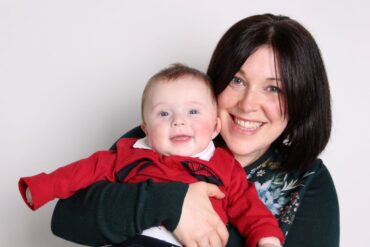Reason #3: Baby is uncomfortable
Some possible reasons are: baby is too hot or too cold, they are gassy or experiencing teething pain. All these things could lead to them “fighting sleep” as like us, it is hard for them to fall asleep when they are uncomfortable. To determine if your baby is too hot or too cold, the best way is to feel the back of the neck. Some signs that baby is too cold include moving around the crib, preferring tummy position, tucking hands into body, and waking often wanting to be held. Some signs they are too hot include being sweaty and hot around neck and back, breathing too fast or shallow, and having flushed, red skin. Signs that baby is gassy include squirming, pulling legs up to their chest and being difficult to console. Signs that baby is experiencing teething pain include being fussier than usual, drooling, refusing milk, and gums appearing sore and red where the tooth is coming through.
Signs that baby is gassy include squirming, pulling legs up to their chest and being difficult to console.
What to do? Once you have determined the potential cause, you can try out different strategies to ease their discomfort. For example, if baby is too hot, you could remove a layer of clothing and/or adjust the room temperature. If you have determined that baby is gassy, you could try laying them on their back and pedaling their legs with your hands to help them expel gas. (Note: if excess gas is an ongoing issue, it is something you should talk to your doctor/naturopath/lactation consultant about as it could be due to food sensitivity or an undiagnosed tongue tie). If you have determined that baby is teething, you could let them chew on a cold object such as a clean, cool washcloth and/or breastfeed if possible as it contains pain-relieving substances.
Reason #4: Baby is going through a sleep progression
Sleep progressions are periods where your baby is going through intense growth and development, which can lead to them sleeping less than usual and fighting sleep. These progressions happen at various stages but most commonly at 4 months, 6 months, 8-10 months, 1 year, 18 months and 2 years.
Sleep progressions are periods where your baby is going through intense growth and development, which can lead to them sleeping less than usual and fighting sleep.
What to do? The specific strategies differ depending on the progression, but in general, try to have as much patience and flexibility as you can during these times. For example, try different ways of getting them to sleep such as by using a carrier or going for a walk in the stroller. Also, many of these progressions relate to baby learning new skills. Therefore, giving them lots of time throughout the day to work on these skills could help so they aren’t wanting to practise at sleep times! Furthermore, some of the progressions are marked by peaks in separation anxiety (eg. 8-10 months, 1 year) so ensuring you are spending connected time with your baby throughout the day could go a long way to help them feel more secure.
I hope that by reading this post, you were able to find the explanation you were looking for as to why your baby is fighting sleep.
Aileen is the founder of Connected Slumber Baby/Toddler Sleep Support and is a Certified Baby-Led Sleep and Well-Being Specialist. She takes a holistic approach to sleep meaning she is experienced in identifying underlying factors that could be impacting your child’s sleep as well as helping you make changes in a gentle and responsive manner, always keeping the attachment relationship at the forefront. Furthermore, she is very passionate about helping you understand biologically normal infant sleep and reducing the stress you may feel around sleep so you can focus on being the best parent you can be. To find out more about how she can help support you, follow her on Instagram @connectedslumber and check out her website www.connectedslumber.com.










